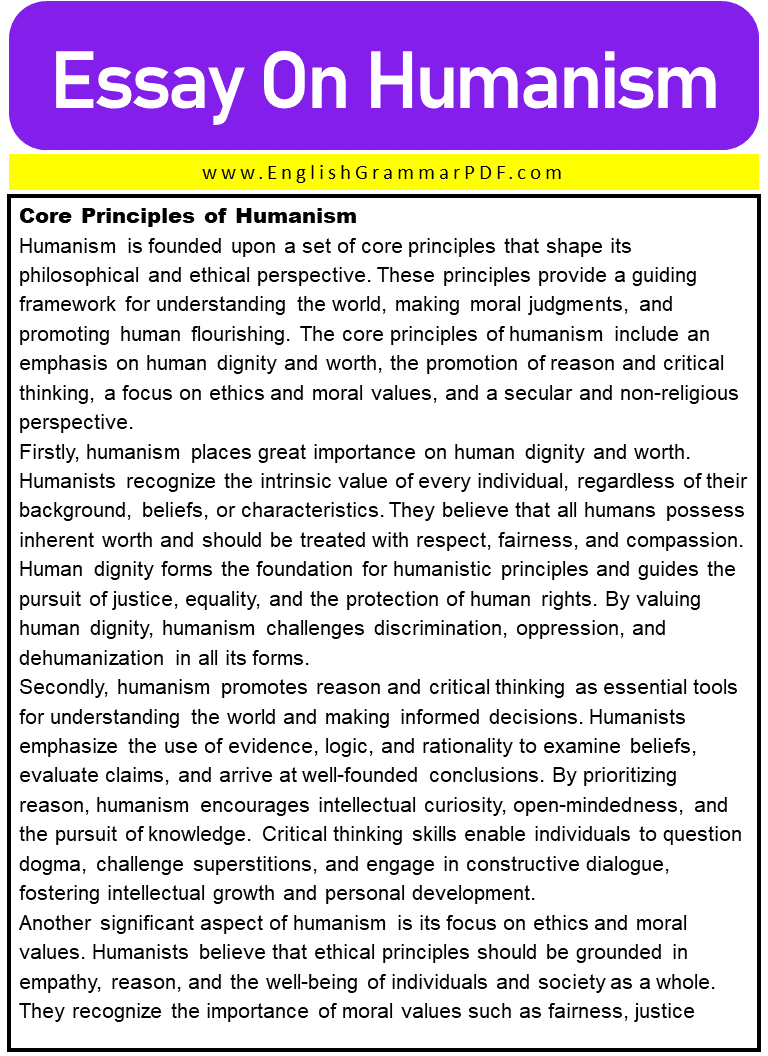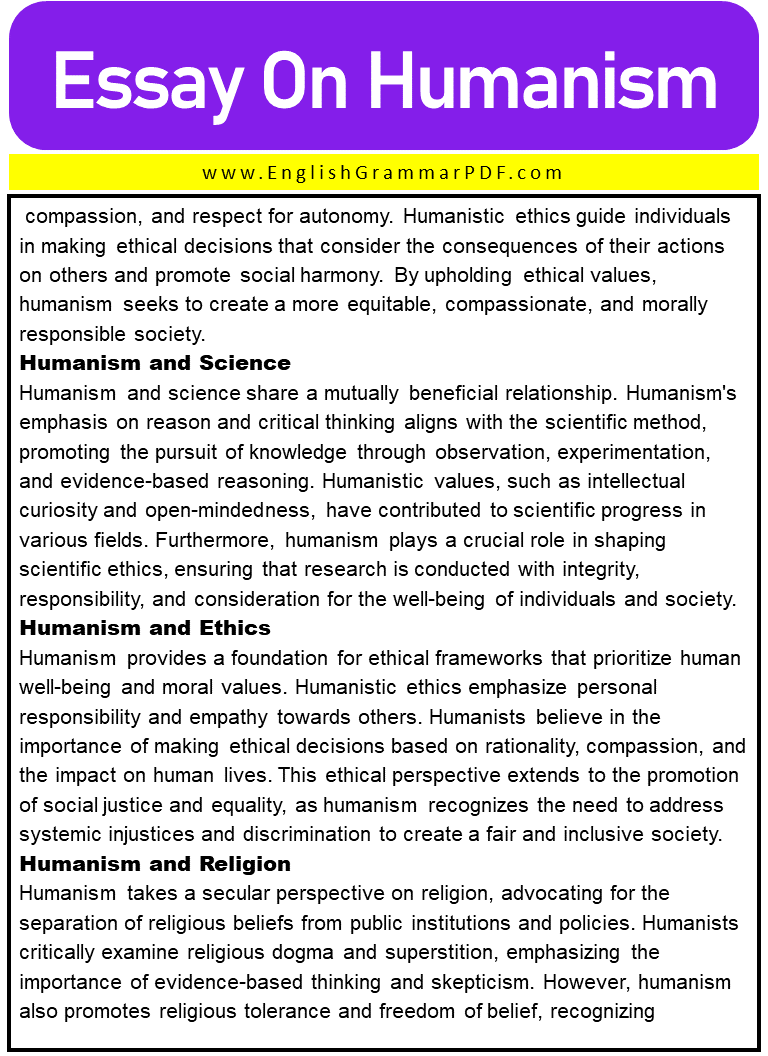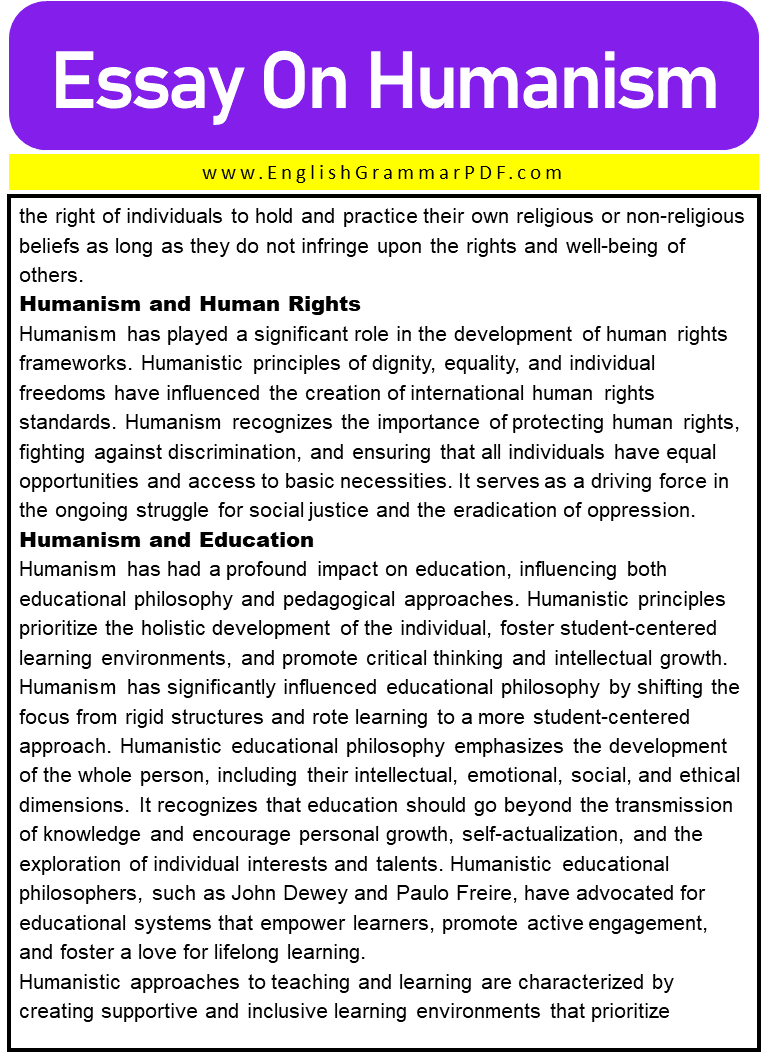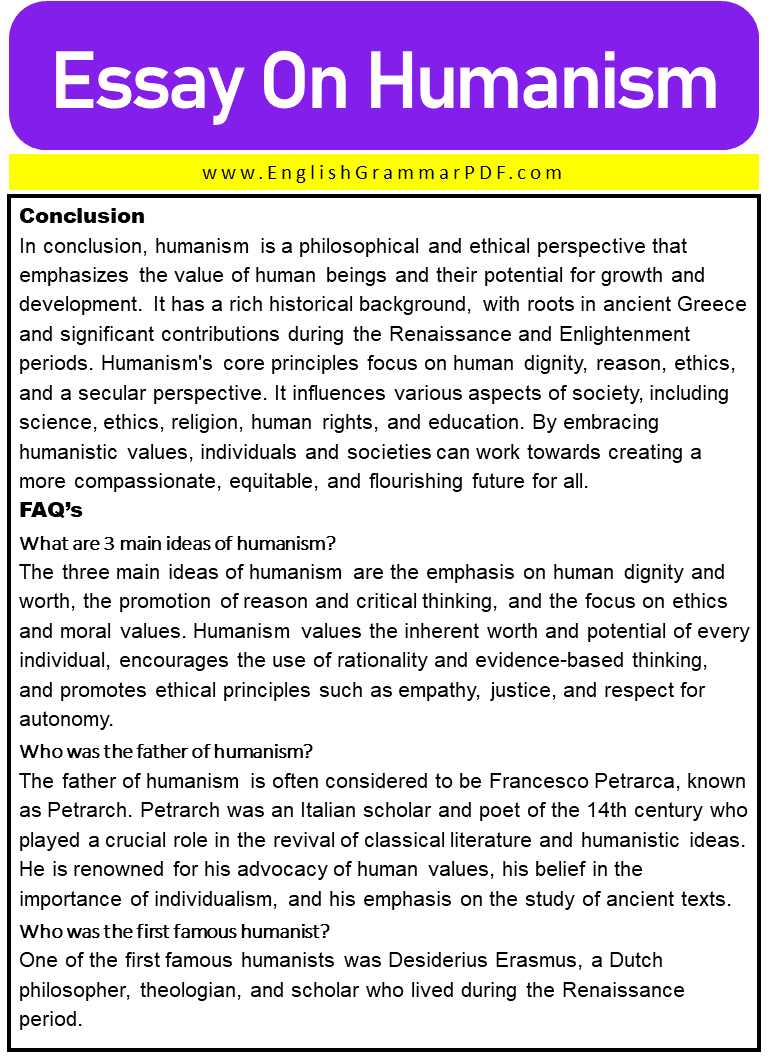Essay On Humanism
Outline of Essay:
- Introduction
- Historical Development of Humanism
- Core Principles of Humanism
- Humanism and Science
- Humanism and Ethics
- Humanism and Religion
- Humanism and Human Rights
- Humanism and Education
- Criticisms and Challenges to Humanism
Introduction
Humanism is a philosophical and ethical perspective that places value on the dignity, worth, and potential of human beings. In modern society, humanism has gained significant importance as a guiding principle for personal and societal development. It promotes rational thinking, ethical values, and a secular worldview. This essay will explore the concept of humanism, its historical development, core principles, and its impact on various aspects of society.
Historical Development of Humanism
Humanism finds its roots in ancient Greek philosophy, where thinkers like Socrates, Plato, and Aristotle emphasized the importance of human reason and the pursuit of knowledge. The Renaissance period witnessed a resurgence of humanistic ideas, with scholars and artists embracing human potential and individuality. This cultural movement had a profound impact on European society, leading to advancements in art, literature, and science. The Enlightenment further propelled humanism by advocating reason, skepticism, and the rights of individuals.
Core Principles of Humanism
Humanism is founded upon a set of core principles that shape its philosophical and ethical perspective. These principles provide a guiding framework for understanding the world, making moral judgments, and promoting human flourishing. The core principles of humanism include an emphasis on human dignity and worth, the promotion of reason and critical thinking, a focus on ethics and moral values, and a secular and non-religious perspective.
Firstly, humanism places great importance on human dignity and worth. Humanists recognize the intrinsic value of every individual, regardless of their background, beliefs, or characteristics. They believe that all humans possess inherent worth and should be treated with respect, fairness, and compassion. Human dignity forms the foundation for humanistic principles and guides the pursuit of justice, equality, and the protection of human rights. By valuing human dignity, humanism challenges discrimination, oppression, and dehumanization in all its forms.
Secondly, humanism promotes reason and critical thinking as essential tools for understanding the world and making informed decisions. Humanists emphasize the use of evidence, logic, and rationality to examine beliefs, evaluate claims, and arrive at well-founded conclusions. By prioritizing reason, humanism encourages intellectual curiosity, open-mindedness, and the pursuit of knowledge. Critical thinking skills enable individuals to question dogma, challenge superstitions, and engage in constructive dialogue, fostering intellectual growth and personal development.
Another significant aspect of humanism is its focus on ethics and moral values. Humanists believe that ethical principles should be grounded in empathy, reason, and the well-being of individuals and society as a whole. They recognize the importance of moral values such as fairness, justice, compassion, and respect for autonomy. Humanistic ethics guide individuals in making ethical decisions that consider the consequences of their actions on others and promote social harmony. By upholding ethical values, humanism seeks to create a more equitable, compassionate, and morally responsible society.
Humanism and Science
Humanism and science share a mutually beneficial relationship. Humanism’s emphasis on reason and critical thinking aligns with the scientific method, promoting the pursuit of knowledge through observation, experimentation, and evidence-based reasoning. Humanistic values, such as intellectual curiosity and open-mindedness, have contributed to scientific progress in various fields. Furthermore, humanism plays a crucial role in shaping scientific ethics, ensuring that research is conducted with integrity, responsibility, and consideration for the well-being of individuals and society.
Humanism and Ethics
Humanism provides a foundation for ethical frameworks that prioritize human well-being and moral values. Humanistic ethics emphasize personal responsibility and empathy towards others. Humanists believe in the importance of making ethical decisions based on rationality, compassion, and the impact on human lives. This ethical perspective extends to the promotion of social justice and equality, as humanism recognizes the need to address systemic injustices and discrimination to create a fair and inclusive society.
Humanism and Religion
Humanism takes a secular perspective on religion, advocating for the separation of religious beliefs from public institutions and policies. Humanists critically examine religious dogma and superstition, emphasizing the importance of evidence-based thinking and skepticism. However, humanism also promotes religious tolerance and freedom of belief, recognizing the right of individuals to hold and practice their own religious or non-religious beliefs as long as they do not infringe upon the rights and well-being of others.
Humanism and Human Rights
Humanism has played a significant role in the development of human rights frameworks. Humanistic principles of dignity, equality, and individual freedoms have influenced the creation of international human rights standards. Humanism recognizes the importance of protecting human rights, fighting against discrimination, and ensuring that all individuals have equal opportunities and access to basic necessities. It serves as a driving force in the ongoing struggle for social justice and the eradication of oppression.
Humanism and Education
Humanism has had a profound impact on education, influencing both educational philosophy and pedagogical approaches. Humanistic principles prioritize the holistic development of the individual, foster student-centered learning environments, and promote critical thinking and intellectual growth.
Humanism has significantly influenced educational philosophy by shifting the focus from rigid structures and rote learning to a more student-centered approach. Humanistic educational philosophy emphasizes the development of the whole person, including their intellectual, emotional, social, and ethical dimensions. It recognizes that education should go beyond the transmission of knowledge and encourage personal growth, self-actualization, and the exploration of individual interests and talents. Humanistic educational philosophers, such as John Dewey and Paulo Freire, have advocated for educational systems that empower learners, promote active engagement, and foster a love for lifelong learning.
Humanistic approaches to teaching and learning are characterized by creating supportive and inclusive learning environments that prioritize the needs and interests of students. Humanistic educators emphasize building positive relationships, trust, and collaboration with students. They value the uniqueness of each learner and strive to create an atmosphere that encourages self-expression, creativity, and personal autonomy. In humanistic classrooms, teachers act as facilitators, guiding students’ exploration of topics and allowing for individualized learning paths. Student-centered strategies, such as project-based learning, cooperative learning, and experiential learning, are often employed to engage students actively in their education.
One of the significant contributions of humanism to education is its focus on fostering critical thinking and intellectual growth in students. Humanistic education encourages students to question, analyze, and evaluate information critically. By promoting a spirit of inquiry and skepticism, humanism equips students with the skills necessary to think independently, solve problems, and make informed decisions. Humanistic approaches encourage students to develop their own perspectives, challenge assumptions, and engage in reasoned debates. Through the emphasis on critical thinking, humanism aims to cultivate intellectually curious and active citizens who can navigate complex issues in an ever-changing world.
Criticisms and Challenges to Humanism
While humanism has gained widespread acceptance, it also faces criticism and challenges. Religious and philosophical critiques argue that humanism can lead to moral relativism and the loss of objective values. Additionally, in a globalized world, cultural and ideological differences present challenges in maintaining a balance between individualism and collective well-being. Humanism must navigate these complexities to ensure that its principles promote human flourishing without neglecting the needs and values of diverse communities.
Conclusion
In conclusion, humanism is a philosophical and ethical perspective that emphasizes the value of human beings and their potential for growth and development. It has a rich historical background, with roots in ancient Greece and significant contributions during the Renaissance and Enlightenment periods. Humanism’s core principles focus on human dignity, reason, ethics, and a secular perspective. It influences various aspects of society, including science, ethics, religion, human rights, and education. By embracing humanistic values, individuals and societies can work towards creating a more compassionate, equitable, and flourishing future for all.
FAQ’s
What are 3 main ideas of humanism?
The three main ideas of humanism are the emphasis on human dignity and worth, the promotion of reason and critical thinking, and the focus on ethics and moral values. Humanism values the inherent worth and potential of every individual, encourages the use of rationality and evidence-based thinking, and promotes ethical principles such as empathy, justice, and respect for autonomy.
Who was the father of humanism?
The father of humanism is often considered to be Francesco Petrarca, known as Petrarch. Petrarch was an Italian scholar and poet of the 14th century who played a crucial role in the revival of classical literature and humanistic ideas. He is renowned for his advocacy of human values, his belief in the importance of individualism, and his emphasis on the study of ancient texts.
Who was the first famous humanist?
One of the first famous humanists was Desiderius Erasmus, a Dutch philosopher, theologian, and scholar who lived during the Renaissance period. Erasmus is renowned for his influential writings on humanistic ideas and his criticism of religious dogma and superstition. His works, such as “The Praise of Folly” and his edition of the New Testament, played a significant role in shaping humanistic thought and promoting intellectual freedom.
Explore More Essays:
Essay On Love And Relationship
Download the PDF of Essay









